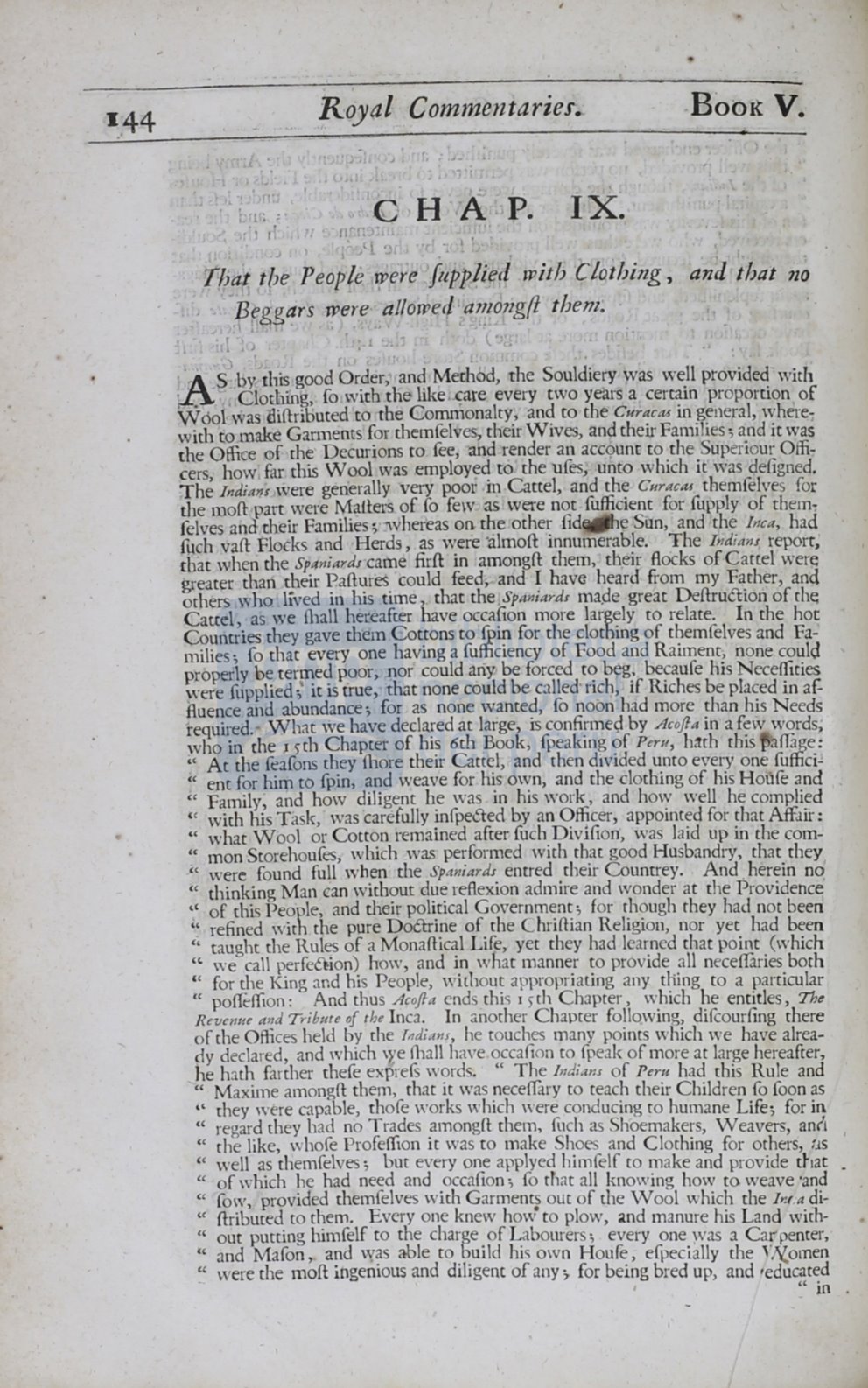

BooK: V.
Royal
Commentaries•
..
,.
IX.
That
tbe
People
were fupplied
with Clothing,
and
that
no
Beggars
were aPowed
an_iong(t the111.
·
J
•
r:A
S
by ,,this
good Order; and Method, the
ouldiery was well provided with
~
Clothing,
fo
with the like care every two years a certain proportion of
Wool as
illributed co the Commonalty, and co the
CuracM
in
general, where:
with to make Garments for themfelves, their Wives, and their Fami ies; and it was
the Office
@f
the Decurions to fee, and render an account to the uperiour Offi–
cers how far this Wool was employed to the ufes, unt-0
hich it was defigned.
Th~
Indians
were generally
very
poor in Cartel, and the
CuractU
themfelves for
the mofr
part
~ere
Matlers
of
fo
few
as
were not fufficienc for fupply of them–
felves and their Familie ; whereas on the other fid
e un, and the
Inca,
had
fuch vafl: Flocks and Herds , as
V\
ere ·almoll innumerable. The
IndianJ
report,
that
hen the
Spt1tniardJ
came
fufi
in
among!l: them, their flocks of Cartel were
greater than their Pafiures could feed, and I have heard from
my
Father, and
others \,;,·ho lived in his
time~-
that the
Spaniards
mape great Defiruction of the
Cattel, as we {hall hereafter nave occafion more largely to relate.
In the hoc
Countries they gave them
Cot~ons
to
fp~
for the clothing of
t~emfelves
and Fa–
milies;
[o
that every one havmg a fuffic1ency of Food and Raiment, none could
proper1y be termed poor, nor could
ariy
be forced to beg, becaufe hi
eceffities
were fupplied;
it
is
true, that none could be cJlled· rich,
if
Riches be placed in af–
fluence and abundance; for as none wanted,
fo
noon had more than his Needs
required. What we have declared at large,
is
confirmec;l by
Acofta
in a few words,
wno in the 15th Chapter of his 6th Book, [peaking of
Peru,
h!th this
a~ge:
'' At the feafons they fhore their Canel, and then divided unto every one
fuftici–
" ent for him to fpin, and \.\eave for his own, and the clothing of his Hou[e and
" Family, and how diligent he was in his vrnrk, and how well he complied
<c
with his Ta k, was carefully infpeet:ed by an Officer, appointed for that Affair:
" what Wool or Cotton remained after fuch Div1fion, wa
laid up in the com–
" moo Storehoufes, ' hich
v
as performed with that good Husbandry, that they
" '-"ere found full '
hen
the
Spaniards
entred their Countrey. And . herein no
" thinking Man can ' itbout due reflexion admire and wonder at the Providence
'' of this People, and their political Government; for th ugh rhey had not been
" refined \Vith the pure Dofuine of the
hrifiian Religion, nor yet had been
' ' taught the Rules of a Monall:ical Life,
yet
they had learned that point (which
'c.
we call perfe&ion) how, and in what manner to pro ide
all
neceifaries both
' ' for the King and his P eople, without
a~
propriating any tliing to a particular
" poffeffion : And thus
Acoffa
end thi5
1
5th Chapter, which he entitles,
The
R evenue
a'!.d
T ribute of the
Inca.
In
another Chapter following, difcourfing there
f
the Oftices held by the
ft'Jdians ,
he touches many points '-" hich \'.\'e have alrea–
dy declared, and' hich' e
fhall
ha' e occafion to [peak of more at large hereafter,
he hath farther thefe
expre~
word .
" The
Indians
of
Peru
had this Rule and
" Maxime amongfl: them, that it was neceffary t
tea h their Children
fo
foon as
'' they were capable, thofe works which were c nducing to humane Life; for in
'' regard they had n T rades amongfl: them, foch as hoemakers, Weavers,
an?l
" cbe like, ' hofe
rofeffion
it
was
to
make
ho
and Clorhing for others,
:Js
" \vell as rhemfelves; but every one applyed him[el f
t
make and provide that
" of, hich he had need and occafion ;
fi
that all knowing how to weave ·and
" fmv, provided themfelves with
Garmen~
out
f the \Vool which the
f
P.f,a
di–
" fiributed to them. Every one knew how to plo'v'i, and manure his Land with–
,, out putting himfelf
to
the charge
f
Labourer ; every one' as a C arpenter,
'' and Mafon, and was able
t
build hi own Houfe, e[pecially the
Y
omen
" \ ere the moft ingenious and diligent of
any;
for being bred up, and 'educated
" in














